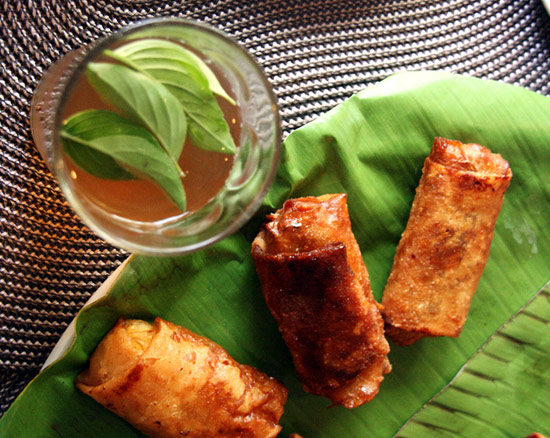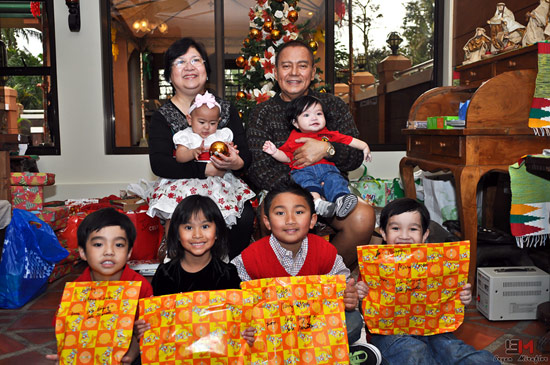Culture and Society: Gift Giving
General
In the fun-loving and family-oriented Philippines, people love to give and receive gifts and take a lavish approach to Christmas and birthdays. There is no strict protocol for giving and receiving gifts, other than the expectation that gifts be modest. An overgenerous gift may be construed as a bribe. Food – especially of the sweet and indulgent kind – is welcome in most contexts.
Hospitality Gifts
When a Filipino entertains at home, it is customary for the guest to either mail a gift ahead of time arrival or to bring one along on the day. Candy, cakes (such as turon banana eggrolls or bibingka rice flour and egg treats), cookies (such as Chips Ahoy!) or flowers are preferred, for Filipinos love to comfort-snack throughout the day. A foreign guest might give a souvenir or craft from his or her home country, which Filipinos generally regard as well-designed and luxurious (especially if the item is from a Western country). Gifts are wrapped stylishly and a small message card is usually included. It’s customary for the gift to be given upon arrival, passed with the right hand while exchanging smiles. The recipient will open the gift later, after the guest has left, in order to avoid embarrassment for either party should the gift be inappropriate.
Filipinos tend to be sensitive about all matters of hospitality, so guests avoid bringing savory dinner-like foods or liquor lest this is taken as a criticism of their host’s abilities. Shortly after the event, it is considered polite for the guest to send a thank-you note, and possibly a small gift such as a fruit basket.
Personal Gifts
Some say that the Spanish gave Filipinos Christianity and the Americans gave them consumerism. Thus Christmas is a major gift-giving occasion when family members, friends, work colleagues and schoolmates shower one another with small presents. One favorite is a ball of Marca Pina cheese that has a distinctive, shiny red packaging.
The esteem in which Filipinos hold their children is evident in the extravagant birthday parties thrown for them. Party games include smashing a piñata open to release candies, chocolate bars, and mini toys.
Due to the wide variety of religious beliefs and tribal practices across the archipelago, wedding customs differ from province to province. Some communities have a unique way of dispensing wedding gifts: pinning one-peso bills onto the bride and groom’s clothing as they dance. This sometimes takes the form of a competition to see whether the bride or groom can collect more cash. A chamber pot is thought to bring good luck to the happy couple. Household items are also appreciated.
During baptisms—a common social event in this religious society—guests toss gifts of small change to all the children present.
Business Gifts
Business associates exchange gifts as a way of clinching deals and developing relationships. Typically, one only gives presents to leading figures such as owners and managers, and not to the entire team or workforce. In business, Filipinos are extra careful to avoid accusations of bribery, usually offering modest, work-related gifts such as stationery or desk accessories. It’s also common for businesspeople to take each other out for a meal or merienda (afternoon snack)—this also affords an opportunity for discussion and negotiation. When a deal is struck, more expensive gifts such as single malt whisky (local or imported) are typically exchanged between men. Flowers are an acceptable gift for women in business. Middle-class Filipinos often give their low-income domestic staff and security guards gifts of food that can be shared with their families.
Taboos
Although Filipinos are generally relaxed about gift giving, their cheerily polite disposition prevents them from outwardly expressing if a gift is inappropriate or has caused offense. They find it hard to say "no" or to refuse anything, so the onus to observe etiquette rests squarely on the giver.
Flowers such as lilies and chrysanthemums signify death and are generally shunned. The same applies to knives which can symbolize the severing of a relationship.
There is a belief amongst the middle-classes that neither money nor liquor should be given to poorer people in case they use it irresponsibly. Filipino Muslims, who largely inhabit the southern island of Mindanao, do not give each other alcohol for religious reasons.
Filipino men typically avoid giving gifts of perfume to women who are not close friends or family members, for this can be deemed too personal a gesture.
Muslims and certain other Filipinos do not give or receive presents with their left hand for traditional reasons of hygiene.
Article written for World Trade Press by Tom Sykes.
Copyright © 1993—2025 World Trade Press. All rights reserved.

 Philippines
Philippines 

